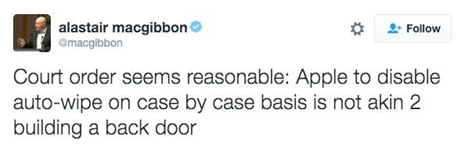Apple's refusal to create software for iOS that would give law enforcement access to information stored on the devices under warrant has received both praise and criticism from government figures around the world.
.jpg&h=420&w=748&c=0&s=0)
A US judge this week ordered Apple to provide "reasonable technical assistance" to the US government to recover data stored on an iPhone 5c used by those accused of shooting to death 14 people in San Bernardino, California late last year.
The assistance includes disabling the auto-erase function that wipes personal data off iPhones if more than ten efforts at guessing the passcode are made.
Apple said it intended to contest the order. Chief executive Tim Cook on Wednesday published an open letter to the company's customers, outlining why encryption was important in keeping personal information safe.
Cook said while Apple has - under subpoenas and warrants - provided information for the San Bernardino case as well as engineers to assist the FBI, the company would not create "dangerous" backdoors to the iPhone.
"Specifically, the FBI wants us to make a new version of the iPhone operating system, circumventing several important security features, and install it on an iPhone recovered during the investigation. In the wrong hands, this software — which does not exist today — would have the potential to unlock any iPhone in someone’s physical possession," Cook wrote.
The removed security features and new capabilities added to iOS would allow brute-forcing of the passcode used to provide access to iPhones.
Australian Greens communications spokesperson Scott Ludlam supported Apple's decision to not help the FBI, arguing building a backdoor for iOS would be "extraordinarily reckless" and put every single user of Apple's mobile operating system at risk of identity theft.
Ludlam called on Attorney-General George Brandis to help keep millions of Australian smartphones users safe, and to contact his US counterparts to ask them to reconsider the request "to break a technology that we all rely on".
The senator's plea fell on deaf ears however, with Brandis arguing Apple should comply with the court order.
Speaking to the ABC, Brandis voiced concerns about data encryption becoming ubiquitous, leaving the information inaccessible for law enforcement agencies.
"I think it shows how important it is that ISPs do cooperate with law enforcement agencies in facilitating and cooperating with proper investigations into serious crime," Brandis told the ABC.
The Australian children's e-safety commissioner, Alastair MacGibbon, took to Twitter to similarly express his support for the court order, deeming it "reasonable" and arguing it was not the same as building a backdoor.
In the United States, Republican presidential election hopefuls Donald Trump and Marco Rubio have swung behind the government's demand to disable iOS security features.
However, Apple's decision to oppose the court order was supported by civil rights lobby group the Centre for Democracy and Technology in Washington DC, which said it would join the IT giant in its fight against the government.
"If the order stands, the defective operating system could be installed over any existing version of iOS, enabling law enforcement officials to guess the password on a cell phone," CDT's director of its freedom, security and technology project Greg Nojeim said.
"If the order stands, Apple and other technology companies could be ordered to build backdoors – essentially defects – into other devices, rendering them insecure and vulnerable to attack by law enforcement and by others as well.
"We will fight against this result."
Sundar Pichai, the chief executive of Google, came out swinging in support of Cook and Apple.
In a series of tweets, Pichai said requiring companies to hack their customers would be "a troubling precedent".
He said Google complied with lawful requests for user data, and he and his company were looking forward to a “thoughtful and open discussion on this important issue".
The Electronic Frontier Foundation digital rights organisation also said it would support Apple against the government.





_(28).jpg&h=140&w=231&c=1&s=0)






 iTnews Benchmark Awards 2026
iTnews Benchmark Awards 2026
 iTnews Executive Retreat - Security Leaders Edition
iTnews Executive Retreat - Security Leaders Edition
 iTnews Cloud Covered Breakfast Summit
iTnews Cloud Covered Breakfast Summit
 The 2026 iAwards
The 2026 iAwards












_(1).jpg&h=140&w=231&c=1&s=0)



